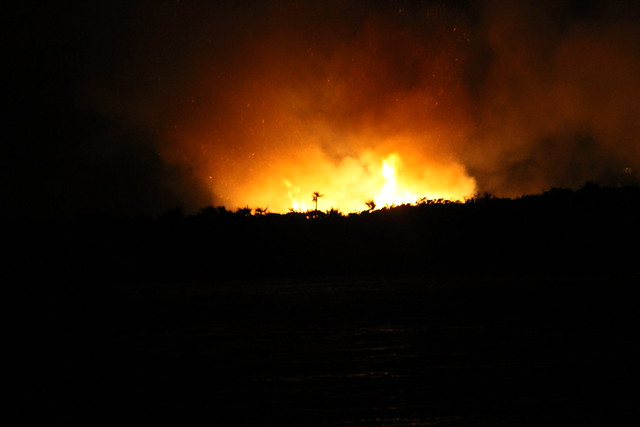Sometimes the world is on fire and there is nothing you can do about it. It is the most frustrating feeling in the world.
The news has been dramatic recently: the president of Haiti was assassinated, the Cuban people have taken to the streets in counterrevolutionary protests, churches are burning in Canada, Venezuelans are fleeing their country in record numbers (I read that 17,000 have arrived in the United States via Mexico in the last eight months alone), and armed mobs were looting and burning their way across South Africa. But it’s not just “news” to me—I am weighed down by the personal impact it has on people close to me.
I have a Cuban friend who escaped Communist Cuba when he was a teenager. He has been waiting a lifetime for an end to that failed form of government on his island homeland. He is wondering, “Will the voice of the people be heard this time, or will their hopes be dashed as they have been before?” Support for the protestors made it all the way to our small town—with Cuban expats demonstrating and flying Cuban flags. “Patria y Vida” is everywhere. My friend in Venezuela informs me that the situation is getting worse there, too. His family is rationing food and trying to figure out how to escape because staying is becoming harder and harder. He is a doctor whose hospital can no longer pay him to work, nor can it afford supplies and medicine. Another close friend and fellow sailor returned to South Africa to sell her house and renew her passport (which expired during COVID lockdowns while she was stuck in another country). Nearby villages have been destroyed in the violence of recent days and neither the police nor military were much help to the citizens. She and her neighbors defended their own community and scrounged supplies until delivery trucks could move and stores could open again. I am checking in with her regularly, both to provide moral support and to reassure myself that she is still okay. Amidst all this trouble, what can I do?
I can pray. I can do it at the first sign of trouble—not waiting until it’s a last resort—asking for peace or wisdom or healing as I, or my friend, or family member navigate an uncertain circumstance. It is a simple act that can have a big impact. Paul admonishes believers not to “be anxious about anything, but in every situation, by prayer and petition, with thanksgiving, present your requests to God” (Philippians 4:6). To keep my worries at bay, this is what I do: I start here, with the Serenity prayer, adding details about the frustrating situation about which I can do nothing, asking forgiveness for personal failures, and expressing a desire to change or to help where I can:
God, grant me the serenity to accept the things I cannot change,
Courage to change the things I can, and
Wisdom to know the difference. –Richard Niebuhr (1892-1971)
I do believe that praying makes a difference—this energy we send to and receive from an unseen (though not unperceived) God and share with others. I believe that love is real and tangible, that there is a source of this unconditional Love in the universe, that it transcends time and space, and combats evil. But even for those who don’t believe in a God who listens, prayer can, at the very least, make them feel more peaceful, and help them discern what is within and outside of their control. Even Ayn Rand, the famous author and avowed atheist, liked the serenity prayer for the way it helps a person make sense of the frustrating dilemma of existence. You can read her thought-provoking essay here: https://courses.aynrand.org/works/the-metaphysical-versus-the-man-made/.
When I can send tangible help, I do. But when money or supplies or volunteering or petitions or letters to congressmen or votes cannot fix a situation, I can certainly appeal to God, who knows what’s best and can see an outcome that I cannot. More importantly, it can help me accept, extract meaning from, and find hope despite the absurdity of life. On the other side of a difficult situation, I have often been able to see a purpose in suffering or hardship. This allows me to be grateful in tough times, even when the outcome looks unpleasant. From South Africa, I have heard similar words. Ferdi Barnard wrote an open letter to the Zuma supporters and criminal looters, to the unhelpful government, police, and military, thanking them for the circumstances that led to people of all races and backgrounds banding together to protect their own communities.
This brings me to a last point about prayer: when done in concert, prayer can bring people together in compassion and unite them for a common cause. I have prayed with a friend during a contentious election—knowing that we voted differently—but able to agree that we want a peaceful outcome, that we want whoever is in office to make wise decisions, and that we want what’s best for our country. Prayer not only gives us a way to deal with our uncertainty and frustration, but it helps us focus on the positive and create unity. Whatever your religious background or philosophy on the meaning of life, prayer can be a powerful way to deal with overwhelming circumstances. Perhaps if we spent more time praying and less time arguing, we would create the peace for which we are praying.

